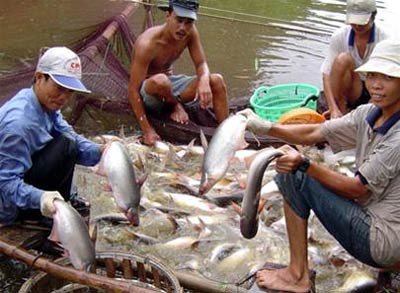
| Vietnam cautioned about new wave of anti-dumping lawsuits | |
According to the Vietnam Chamber of Commerce and Industry (VCCI), there have been 35 anti-dumping lawsuits against Vietnam so far, including two against Vietnam’s seafood export products, the tra and basa lawsuit in 2001 and the shrimp lawsuit in 2003. Periods of economic crisis allow low-cost products to expand their markets, but these times are also when developed countries strengthen protective measures, using anti-dumping lawsuits, among other strategies.
The Vietnam Association of Seafood Exporters and Producers (VASEP) has admitted that tra exports have decreased dramatically in the one year since the anti-dumping duty was imposed.
Tra and basa exports to the US have dropped to 10 percent of the total tra and basa export revenues of Vietnam.
One business reported that the demand for tra and basa remains high in the US, because many Mississippi catfish farms have closed due to losses. Anti-dumping duties have reduced catfish imports to the US and the number of exporters to the country has declined to 20 businesses.
Chu Van An, Deputy General Director of Minh Phu Seafood Company, explained that businesses pay a lot of money to cover lawsuits. They also must spend 5-10 years following the terms of the lawsuits, because under current regulations, only when companies enjoy the zero percent duty for three consecutive years are they totally exempt from anti-dumping duties.
Risks on the horizon
Economists say that abuse of anti-dumping duties to restrict imports from Vietnam is really a high risk now, especially when big market enterprises in the US and EU markets are suffering.
Dr Nguyen Thi Thu Trang from the Legal Department of VCCI has warned that she can see “bad signs” from the EU, the largest seafood export market for Vietnam consuming 26 percent of total seafood exports.
The EU is also the market with the most anti-dumping lawsuits against Vietnam (10 cases).
Dr Dinh Thi My Loan, a member of the Trade Remedies Council (TRC) under VCCI, has also cautioned that Vietnamese enterprises are likely to face increased measures by import countries to safeguard trade, especially in Vietnam’s key export items like seafood, farm produce, garments and footwear.
Loan advised that, in order to effectively deal with the anti-dumping lawsuit risks, Vietnamese exporters should follow a reasonable pricing scheme in sensitive markets.
If Vietnamese products are subject to anti-dumping lawsuits, she warned that they will need to prove the export products can benefit the interests of the local community. They also need clear documentation to prove the transparency of their transactions. | |
| VietNamNet + VnMedia |
